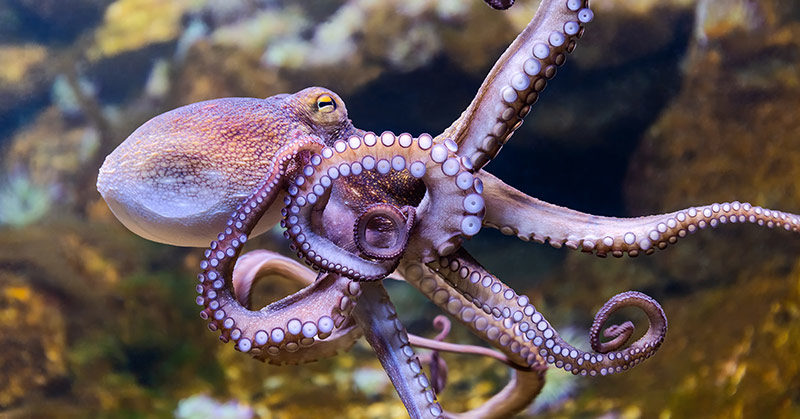Undersea life has always looked somewhat extraterrestrial. Octopuses in particular have an other-worldly quality about them. Many of us, at one time or another, have probably likened them to aliens without thinking much of it.
When 33 scientists do it, however, people pay attention.
Are Octopuses Aliens?
In case you forgot about this odd story, here it is. In August 2015, 33 scientists from a variety of respected institutions published a paper in the journal Nature. The study was entitled “The Octopus Genome and the Evolution of Cephalopod Neural and Morphological Novelties”.
In the study, the authors described octopuses as having a highly complex genome. They predicted that the creatures contained over 33 thousand protein-coding genes, which is far more than humans [1]. Humans, for reference, contain between 20 and 21 thousand (there is still a debate among geneticists as to the exact number) [2].
The paper didn’t receive much attention, however, until June 2016, when several media outlets caught wind of the research. Articles began popping up all over the internet, reporting that after examining octopuses’ DNA, researchers determined that it was alien in origin.
This caused many people to ask the question: are octopuses actually aliens?
The short answer is… no. At least, that’s not what the researchers said. In fact, nowhere in their study did they mention the possibility of octopuses having extraterrestrial origins. They did, however, say the following:
“Our analysis suggests that substantial expansion of a handful of gene families, along with extensive remodelling of genome linkage and repetitive content, played a critical role in the evolution of cephalopod morphological innovations, including their large and complex nervous systems.” [1]
In other words, genetic changes in octopuses over time are the reason behind their highly sophisticated nervous systems and large number of protein-coding genes.
Read: Fish recorded singing dawn chorus on reefs just like birds
How Did the Rumour Start?
According to Snopes, the alien confusion came from a 2015 press release given by study co-author Clifton Ragsdale. In the release, he described the octopus as being “utterly different from all other animals”. He then continued, saying:
“The late British zoologist Martin Wells said the octopus is an alien. In this sense, then, our paper describes the first sequenced genome from an alien.” [3]
In this case, Ragsdale was using the term “alien” in a metaphorical sense. Unfortunately, media outlets grabbed hold of this one comical remark and ran with it. The original paper never mentions anything about space or aliens, however, it appears that none of these new outlets fact-checked the actual study.
More Confusion
A few years later, scientists published another paper on the subject, adding to the debate (and the confusion). In this 2018 paper, researchers offered a somewhat new perspective on evolutionary theory. They proposed that comets carrying genetic material struck the earth, and once conditions were optimal life began to flourish [4].
Specifically, they were referring to one mass extinction that happened over five hundred million years ago. A few million years after that, fossils indicate that there was a sudden burst of life on earth.
“It takes little imagination to consider that the pre-Cambrian mass extinction event(s) was correlated with the impact of a giant life-bearing comet (or comets), and the subsequent seeding of Earth with new cosmic-derived cellular organisms and viral genes,” the study said [4].
The researchers suggested that this could explain why octopuses are so different from their ancestors, the nautiloids. They hypothesized that their genes might actually be from outer space, however, they never proved this theory. They wrote the following in their paper:
“The transformative genes leading from the consensus ancestral Nautilus (e.g. Nautilus pompilius) to the common Cuttlefish (Sepia officinalis) to Squid (Loligo vulgaris) to the common Octopus (Octopus vulgaris) are not easily to be found in any pre-existing life form — it is plausible then to suggest they seem to be borrowed from a far distant “future” in terms of terrestrial evolution, or more realistically from the cosmos at large.” [4]
Many scientists, however, do not take the researchers’ hypothesis seriously. Even the authors of the study themselves note that their theory goes against what most experts believe to be true.
So are octopuses aliens? As of now, the general consensus is no. One off-hand comment caused a frenzy in the media, but most of it was untrue.

